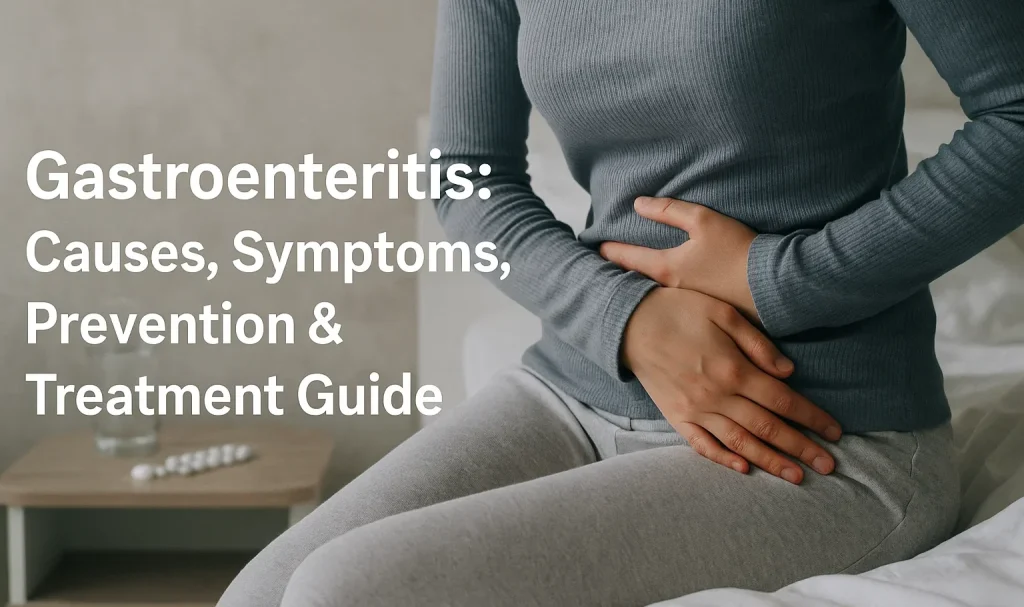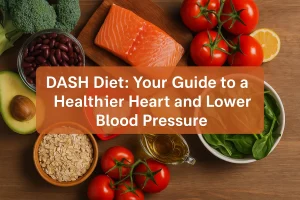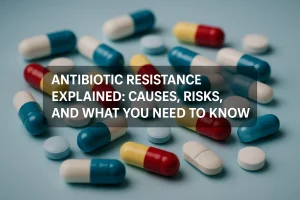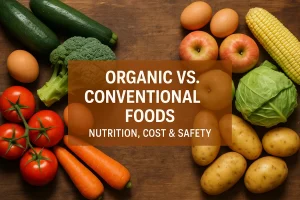
Gastroenteritis: Causes, Symptoms, Prevention & Treatment Guide
Often called the stomach flu, gastroenteritis is a common digestive disease that causes inflammation in the intestines and stomach. Lead to symptoms like Pain in the abdomen, vomiting, diarrhea, and dehydration. Although it usually goes away on its own, managing it effectively and avoiding complications requires an understanding of it. Let’s discuss in this blog about its causes, symptoms, and available treatments.
What is gastroenteritis?
Gastroenteritis refers to the inflammation and irritation in your stomach due to infection in the gastrointestinal tract due by bacteria and viruses. Gastroenteritis is communicable and can be spread from one person to another. People with low immunity are usually at a much higher risk, and it may be life-threatening if not treated in time.
Types of Gastroenteritis
- Viral Gastroenteritis: The most common, accounting for ~60% of gastroenteritis, is caused by viruses like norovirus, rotavirus, or adenovirus. It spreads easily through contaminated food, water, or close contact with an infected person. It usually resolves on its own within a few days.
- Bacterial Gastroenteritis:
Caused by bacteria such as Salmonella, E. coli, Shigella, or Campylobacter, this type often results from eating contaminated or undercooked food. Symptoms are more severe and may include high fever, abdominal cramps, and bloody diarrhea. In some cases, antibiotics are needed for treatment. - Parasitic Gastroenteritis:
Caused by parasites like Giardia lamblia, Entamoeba histolytica, or Cryptosporidium. It often spreads through contaminated water and poor sanitation. Antiparasitic medications are required for treatment. - Toxic Gastroenteritis (Food Poisoning):
Caused by toxins produced by bacteria like Staphylococcus aureus or Clostridium botulinum, this type results in sudden symptoms such as vomiting, abdominal pain, and diarrhea within hours of eating contaminated food. Though usually short-lived, some cases can be serious. - Antibiotic-Associated Gastroenteritis:
More common in the elderly or hospitalized, this occurs after the use of antibiotics, which disrupt the natural gut flora. Symptoms include watery diarrhea, fever, and abdominal cramps and require specific treatment. - Chemical Gastroenteritis:
Substances that irritate the stomach and intestines, like heavy metals, toxic plants, cocaine, chemotherapy drugs, excessive alcohol, and overuse of medications like digoxin, colchicine, or NSAIDs, can cause chemical gastroenteritis. - Traveler’s Diarrhea:
Often caused by a mix of bacteria, viruses, or parasites encountered while traveling, especially in developing countries, it usually resolves in a few days with hydration and rest
What are the Symptoms of gastroenteritis?
The stomach and intestines are the primary targets of gastroenteritis, which can cause a variety of symptoms that differ from person to person. Among the most typical symptoms are:
- Diarrhoea
- Nausea & Vomiting
- Abdominal pain and cramps
- Chills and Body aches
- Loss of appetite
- Swollen Lymph Nodes
You may start to feel sick 1–3 days after coming into contact with the virus. Symptoms may last for 1 to 2 days (mild gastroenteritis) or up to 14 days (acute gastroenteritis). Contact your doctor if symptoms persist.
What causes gastroenteritis?
Multiple viruses are responsible for this disease, depending on the type. The types of viruses that can cause gastroenteritis are mentioned below:
- Rotavirus: It commonly causes stomach flu in children below 13, it may cause slight discomfort in the abdomen, and diarrhoea.
- Norovirus: It affects more than half of adult gastroenteritis patients and is more resilient to disinfectants compared to other gastroenteritis-causing viruses.
- Adenovirus: Usually causes respiratory problems, but may cause gastroenteritis under certain conditions.
- Astrovirus:This virus affects children below the age of 3 and may cause acute gastroenteritis under certain conditions.
What are the risk Factors associated with gastroenteritis?
- If you are above 65 or younger than 6, you may have a chance of getting infected.
- Weakened Immunity makes you highly vulnerable to infection.
- Living in a crowded place or working in daycares or child care homes.
- Travelling to an area with poor sanitation.
- Bad personal hygiene, like not washing hands properly before and after eating or after using the toilet.
- Comes in contact with a person with gastroenteritis.
When to See a Doctor?
If you’re an adult, call your doctor if:
- You can’t keep liquids down for a full day.
- Having diarrhea for more than two days.
- Blood vomit
- You’re dehydrated. Signs of dehydration include extreme thirst, a dry mouth, dark yellow urine or no urine at all, and extreme weakness, dizziness, or lightheadedness.
- Blood in your poop.
- Stomach pain.
- Fever higher than 104°F (40°C).
For babies and kids:If your child has any of the following, call their doctor right away:
- Has a temperature of 102°F (38.9 °C) or higher
- Looks tired or very angry
- Is in a lot of pain or discomfort
- Has bloody diarrhea
- If it’s dehydrated, watch for it by comparing how much they drink and urinate
Diagnosis and Test: How to Diagnose Gastroenteritis
Physical examinations are the first step in the diagnosis process. Your doctor checks for fever, bloating, stomach pain, or dehydration. They may also inquire about your medical history, including past travel experiences and interaction with sick people.
Some of the other tests include
- Stool Examination: A stool sample may be obtained to determine whether the infection is caused by bacteria, viruses, or parasites.
- If necessary, blood tests: Blood tests may be performed to look for infection markers or electrolyte imbalances in cases of severe dehydration or complications.
- Rapid antigen test: Occasionally used to identify viruses, particularly in children, such as norovirus or rotavirus.
- Additional Examinations (if required): If symptoms persist, imaging or a colonoscopy might be considered to diagnose other digestive issues.
Prevention: How to prevent gastroenteritis?
Here are the tips to lower the risk of gastroenteritis
- Wash Hands Frequently: Wash your hands with soap and water, especially after using the restroom, changing diapers, and before consuming or preparing food.
- Adopt Safe Water Practices: Water should always be boiled, filtered, or clean, especially when traveling.
- Maintain Proper Food Hygiene: Avoid raw or undercooked meat and seafood, cook food thoroughly, and wash fruits and vegetables to avoid contamination.
- Avoid Street Food in Unsafe Areas: particularly when visiting areas with bad sanitation.
- Disinfect Surfaces: Frequently clean the surfaces in the kitchen and bathroom, particularly if there is a sick family member.
- Isolate Infected Individuals: Until a person with gastroenteritis recovers, stay away from close contact with them.
- Vaccinate kids: Young children are protected from a common cause of viral gastroenteritis by the rotavirus vaccine.
Conclusion
Maintaining good hygiene and a healthy lifestyle is essential for staying disease-free requires Although it is usually treatable, gastroenteritis affects millions of people worldwide. Your risk can be considerably decreased by taking easy precautions like frequent hand washing and practicing proper hygiene. Keep yourself safe, take these precautions, and be protected from such types of infections.
FAQs
What are the early symptoms of gastroenteritis?
Abdominal cramps, mild fever, diarrhea, nausea, vomiting, and dehydration are common early symptoms.
Is gastroenteritis contagious?
Both bacterial and viral gastroenteritis are extremely contagious. Contaminated food, water, surfaces, or close interaction with an infected individual can all spread it.
How long does gastroenteritis last?
Viral gastroenteritis typically lasts one to three days. Infections caused by bacteria or parasites may take longer and may need treatment.
What foods should I avoid during gastroenteritis?
Stay away from raw, fatty, spicy, and dairy-rich foods. Limit yourself to simple, easily digested foods like boiled potatoes, bananas, rice, and toast.
How can I prevent gastroenteritis naturally?
By washing your hands frequently, drinking clean water, avoiding undercooked food, and keeping your surroundings sanitized, you can prevent gastroenteritis.
What are the different tests required to detect gastroenteritis?
Particular tests, such as stomach profile tests, gastroenteritis panels, and comprehensive gut health packages, can be used to diagnose gastroenteritis, particularly in cases that are severe or persistent.
- Understanding Platelet Count: Normal Ranges, Causes & What Your Results Mean
- Early Cancer Detection in India: Signs, Tests & Screening Guide







